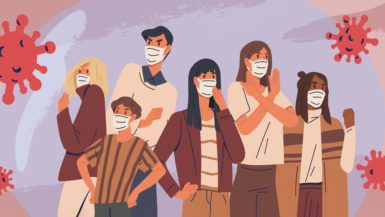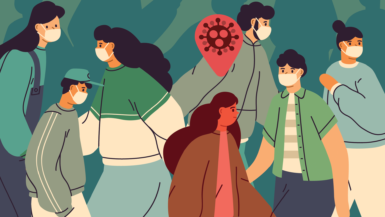In our recent D/NATIVES research (PDF), we explored some big questions about the role of data in the future careers and lives of young people currently in higher education and entering the workforce across the US, UK and Germany.
Finding out that more than half of our respondents felt that their ability to understand data would be as vital to their futures as the ability to read and write, made us want to dig even deeper.
We wanted to know whether data has played a positive role in young people’s understanding of the coronavirus pandemic? And what’s the perception of working in the data industry for students currently in higher education?
That’s why we spoke with Liora, a 21 year old student studying biotech in the US, to get her views on what data means to her in her life.
Do you think there’s a negative perception of job roles that involve working with data? If so, why do you think this is the case?
I think that these roles are regarded as impressive and prestigious, however there can be a negative connotation just in terms of the jobs being intimidating. Often, I think people believe jobs that involve working with data will be too challenging, while not being interesting at all. I believe people imagine just sitting at multiple computer screens with huge amounts of random numbers, not being able to make sense of it and not realizing the impact data can have.
Do you think the COVID-19 pandemic has improved awareness around how positive and exciting working with data can be?
Maybe a little bit. I think there’s now a better understanding of how large amounts of seemingly meaningless data can be analyzed and summarized down into really short and digestible, but impactful, pieces of data. I’d say the pandemic has improved awareness around how positive and exciting data can be – however I’m not sure if it’s improved awareness around how positive and exciting working with data can be.
I still think there’s a societal disconnect between knowing data is out there, being excited to understand data, and actually knowing how to work with data.
How important is data in your life? Has this changed in the last 2-3 years?
Data is incredibly important to me. I’m a very objective and numbers oriented person, and understanding data is one of the best ways to understand a situation or circumstance. Data plays a large role in my academic/research life almost every day. When I’m in lab conducting research, I’m always thinking about how to best collect data and how to analyze it. In my personal life, I’m always picking up on little tidbits here and there that are statements based on data analysis. I’ve always been interested in data/numbers but the realized importance in the last 2-3 years has definitely increased for me.
Throughout your experience in the education system, do you think that there’s been enough emphasis on learning key data skills?
I’m an engineering student right now, and in the engineering curriculum at Northwestern there’s definitely a good emphasis on learning key data skills. However, I do think even more skills could be taught. During my K-12 education there wasn’t a strong enough emphasis on this topic. I think there needs to be an emphasis on the importance of knowing and learning data skills, but then there also needs to be resources to learn given skills.
Have you been inspired by any examples of how data is being used for good causes?
Yes. The All of Us research study that is ongoing and being run by the NIH (National Institutes of Health). The study aims to gather medical data from at least one million people who live in the United States. Individuals volunteer their medical history/data to be studied in order to improve healthcare. The main goal is to gain a better understanding of what impacts people’s health. Participants report health data, habits, and where they live. This study uses data that already exists to accelerate medical research.
Data is being used for good all around the world, such as in the effort to eliminate malaria. Do you think if your peers were aware of the impact of such programmes that they’d be more likely to consider data-related careers?
Yes, I think so! Everyone has a good cause they’re passionate about. So I think if my peers were made aware of specific programs that relate closely to their interests, they’d be more likely to get involved and would be more open to using data to solve an issue they care about.
How do you hope to work with data in your future career and do you think working with data can help you make a positive impact in your work or wider society?
I don’t want to be a data scientist because I want to be involved in research and development in the life sciences/ biotechnology industry, but I know I’ll be working with data in whatever role I choose. I can imagine myself using data to direct my attention to a specific unmet medical need. I’ll also then collect and use data while conducting research and designing the given product. I hope to use data to address some unmet healthcare need and to have a positive impact on society.










